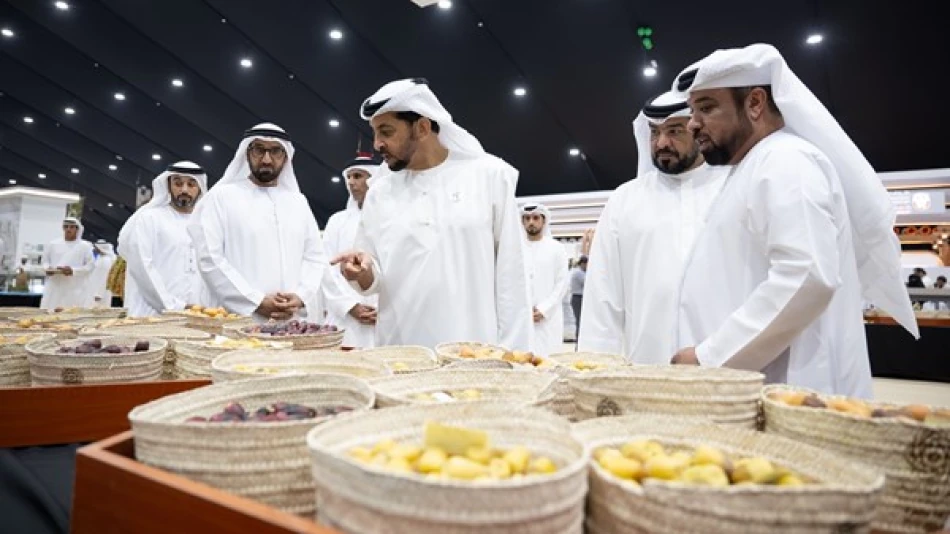
Emirati Ruler Visits Iconic Liwa Date Festival's 21st Edition, Showcasing UAE's Rich Agricultural Heritage
UAE's Liwa Date Festival Showcases Strategic Vision for Cultural Heritage and Food Security
The 21st edition of the Liwa Date Festival demonstrates the UAE's commitment to preserving cultural identity while advancing food security goals, as senior leadership emphasizes the economic and cultural importance of date palm cultivation in the nation's sustainable development strategy.
Royal Patronage Signals National Priority
Sheikh Hamdan bin Zayed Al Nahyan, the Ruler's Representative in Al Dhafra Region, visited the festival's competitions and exhibitions, highlighting the event's significance under the patronage of Sheikh Mansour bin Zayed Al Nahyan, Deputy Prime Minister and Presidential Court Chairman. The festival, organized by the Abu Dhabi Heritage Authority, runs until July 27 in Liwa city.
Sheikh Hamdan emphasized that the festival reflects President Sheikh Mohamed bin Zayed Al Nahyan's deep commitment to preserving Emirati heritage and supporting sectors tied to cultural identity. This approach demonstrates how the UAE leadership views cultural preservation not as a nostalgic exercise, but as a strategic component of national development.
Food Security Through Cultural Heritage
The festival's emphasis on date palm cultivation aligns with broader Middle Eastern trends toward agricultural self-sufficiency. As regional governments face increasing pressure to diversify food sources amid climate challenges and supply chain disruptions, traditional crops like dates offer both cultural continuity and practical solutions.
Economic Empowerment Strategy
The event serves multiple economic functions beyond cultural celebration. By supporting local farmers and productive families, the festival creates economic opportunities in rural areas while maintaining traditional agricultural knowledge. This model parallels successful heritage-based economic development programs seen in countries like Morocco and Jordan.
Innovation Meets Tradition
The festival's structure reveals a sophisticated approach to heritage preservation. Competitions include traditional date beauty contests alongside categories for "largest date cluster" and "palm trunk creativity," while also showcasing modern agricultural innovations. This blend allows farmers to learn about cutting-edge cultivation techniques while celebrating traditional practices.
Market Integration and Product Development
Government and private sector participation in the festival creates a marketplace for date-related products and agricultural tools. This integration helps transform cultural celebration into economic opportunity, providing platforms for traditional craftspeople, small-scale producers, and agricultural technology companies to connect with consumers and distributors.
Regional Context and National Identity
The festival's timing during the UAE's "Year of Community" reflects broader Gulf state efforts to strengthen social cohesion while modernizing rapidly. As the UAE continues its economic diversification beyond oil, cultural industries and sustainable agriculture represent growing sectors that can provide employment while maintaining national character.
The emphasis on date palms as components of national identity demonstrates how the UAE balances rapid modernization with cultural preservation. Unlike purely commercial agricultural initiatives, this approach embeds economic development within cultural frameworks that resonate with local communities.
Investment in Agricultural Heritage
For investors and policymakers, the festival represents the UAE's systematic approach to developing niche agricultural sectors. Date cultivation offers advantages including climate adaptation, water efficiency, and premium market positioning that align with sustainable development goals while supporting rural communities.
The government's sustained support for such festivals indicates long-term commitment to heritage-based economic development, suggesting opportunities for businesses operating in traditional agriculture, cultural tourism, and artisanal food production sectors.
Most Viewed News

 Layla Al Mansoori
Layla Al Mansoori






